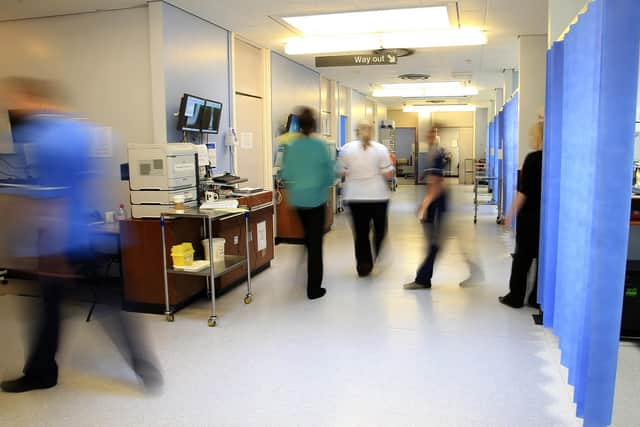Loggerheads over nurses strike action is not good for anyone - Jayne Dowle
At the start of their careers, nurses can expect to earn around £20,000 to £21,000 a year, according to the nurses.co.uk website, roughly comparable to a full-time supermarket worker or logistics picker.
As nursing strikes are planned to start today, with up to 100,000 protestors expecting to walk out across England, there are many arguments in favour of treating nurses – and other medical professionals, including ambulance workers, who are also pursuing industrial action - as a special case.
Advertisement
Hide AdAdvertisement
Hide AdTheir vital role, all too often, is literally a matter of life or death.


And whilst no-one - including Labour leader Sir Keir Starmer, who is warning that this pay demand is “unaffordable” - is expecting nurses to eventually receive the 19.2 per cent pay rise (a five percent increase above retail inflation), they are demanding, it is fair to say that serious consideration should be given to their cause.
However, it is not just about pay. It's a huge matter of conscience, of putting principles over caring for patients. I have friends who are nurses planning to join strike action. Both are wracked with guilt and at the same time determined to make sure their situation is taken seriously.
Unless you have worked on an under-staffed, over-stretched and under-resourced hospital ward, you cannot possibly understand the pressure these professionals are under.
Advertisement
Hide AdAdvertisement
Hide AdIt’s not as if this is the first time concerns have been raised; for years now, nurses have been telling the government that there is a sickness at the heart of the NHS and it starts with unacceptable staffing practices, huge salary gaps and catastrophic failures in recruitment and retention.
The biggest walk-out in the history of the NHS will leave hospitals short-staffed and operations cancelled just before Christmas. It’s already a difficult time of year for hospitals, and even more so this December, with freezing temperatures leading to emergency admissions for accidents, heart attacks and strokes and the rise of Strep A infections amongst children – two weeks ago, a sharp spike led to a 30 per cent increase in UK cases.
Earlier this week, in an unprecedented intervention, Dame Ruth May, chief nursing officer for England, wrote to Pat Cullen, head of the Royal College of Nursing, to say many nursing leaders feel “let down by the RCN”.
The letter, co-signed by her counterparts in Scotland, Wales and Northern Ireland, urged the union to do more to protect patient safety during the walkouts today and next Tuesday
Advertisement
Hide AdAdvertisement
Hide AdThe union’s refusal to fully staff acute hospital wards and A&E units means patients could miss out on lifesaving treatment such as antibiotics, which must be given promptly to prevent death from sepsis and other severe infections, it argued.
Some cancer patients are already having chemotherapy cancelled on strike days, nursing leaders also warned, despite the RCN claiming it would be exempt.
A bitter tit-for-tat ensued, with the RCN arguing it had already committed to derogations - national exemption from strike action - in six areas: chemotherapy, intensive care, kidney dialysis, children’s emergency care, children’s intensive care and neonatal services. But not - at the time of writing -to A&E, urgent surgery and mental health care.
How has it come to this? Local strike committees at the 63 trust at terrible loggerheads with leaders and colleagues. Whatever side you’re on, no-one can argue that this is good for the health of the nation.
Advertisement
Hide AdAdvertisement
Hide AdAnd whilst issues over pay and conditions are extremely pertinent – especially as so many nurses have come forward to say they cannot exist on their monthly salary without recourse to Universal Credit – the real problem goes back further.
The nursing profession, hailed as angels during the pandemic, when they had no choice but to turn up for work when a deadly and entirely unfamiliar pandemic was rampaging through the UK, were badly let down by former Prime Minister Boris Johnson, who promised to remember and honour their sacrifice and commitment.
When Johnson’s government finally did see their way to giving nurses and other NHS staff the reward they so richly deserved, it worked out at a derisory and insulting one per cent pay rise.
Tellingly, Jenny McGee, the nurse at St Thomas’ Hospital in London who kept vigil by the Prime Minister’s bedside when he was in intensive care with Covid was so disgusted, she handed in her resignation, citing the “lack of respect” shown by the Government.